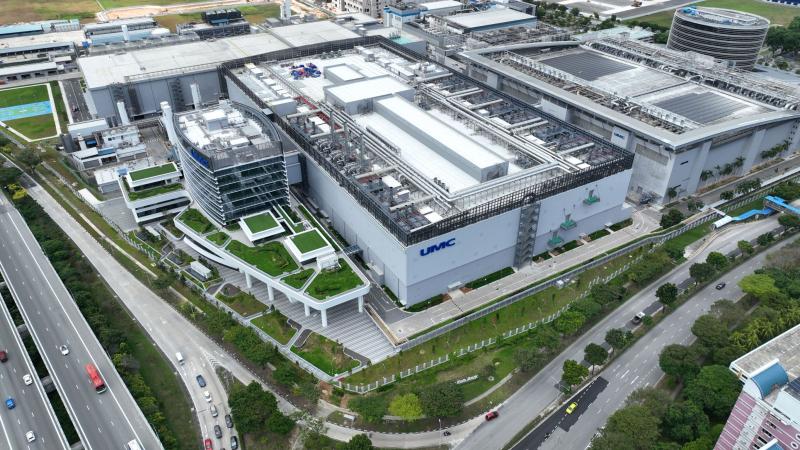United Microelectronics Corp (UMC, 聯電), the world’s No. 4 contract chipmaker, yesterday launched a new US$5 billion 12-inch chip factory in Singapore as part of its latest effort to diversify its manufacturing footprint amid growing geopolitical risks.
The new factory, adjacent to UMC’s existing Singapore fab in the Pasir Res Wafer Fab Park, is scheduled to enter volume production next year, utilizing mature 22-nanometer and 28-nanometer process technologies, UMC said in a statement.
The company plans to invest US$5 billion during the first phase of the new fab, which would have an installed capacity of 30,000 12-inch wafers per month, it said.

Photo courtesy of United Microelectronics Corp
The new fab is to produce chips used in premium smartphone displays, power-efficient memory chips for Internet of Things devices and next-generation connectivity chips, it said.
Together with the existing 12-inch factory, UMC would have a combined capacity of 1 million wafers in Singapore after the new fab becomes operational next year, the chipmaker said.
UMC copresident S.C. Chien (簡山傑) said in the statement that the new fab enhances the chipmaker’s ability to meet demand and enhance its supply chain resilience.

Photo courtesy of United Microelectronics Corp
The capacity expansion plan is expected to create approximately 700 jobs over the next few years, including engineers for process and equipment, as well as research and development.
Separately, UMC said it has no merger-and-acquisition deals on the table at the moment, dismissing a report from online news site Nikkei Asia that the company is restarting a merger assessment with US contract chipmaker GlobalFoundries Inc.
More than 10 years ago, the contract chipmakers considered a merger and consolidation, but the idea was abandoned. UMC and GlobalFoundries both specialize in mature chip production.
In reporting that the two chipmakers were exploring a merger, Nikkei Asia said they were likely to create a bigger US-based company that would have broad production footprints across Asia, the US and Europe.
The report said the merger is expected to help the US gain access to mature chips amid escalating tensions across the Taiwan Strait.
The combination of the two companies would create an entity with a larger market share of 9.3 percent, surpassing Samsung Electronics Inc’s 9.1 percent, if they went ahead with the deal, Taipei-based researcher TrendForce Corp’s (集邦科技) data showed.
GlobalFoundries ranked as the world’s No.5 contract chipmaker after UMC. The San Jose, California-based chipmaker posted a loss of US$26 million last year, while UMC reported a net profit of NT$47.21 billion (US$1.42 billion).

MULTIFACETED: A task force has analyzed possible scenarios and created responses to assist domestic industries in dealing with US tariffs, the economics minister said The Executive Yuan is tomorrow to announce countermeasures to US President Donald Trump’s planned reciprocal tariffs, although the details of the plan would not be made public until Monday next week, Minister of Economic Affairs J.W. Kuo (郭智輝) said yesterday. The Cabinet established an economic and trade task force in November last year to deal with US trade and tariff related issues, Kuo told reporters outside the legislature in Taipei. The task force has been analyzing and evaluating all kinds of scenarios to identify suitable responses and determine how best to assist domestic industries in managing the effects of Trump’s tariffs, he

TIGHT-LIPPED: UMC said it had no merger plans at the moment, after Nikkei Asia reported that the firm and GlobalFoundries were considering restarting merger talks United Microelectronics Corp (UMC, 聯電), the world’s No. 4 contract chipmaker, yesterday launched a new US$5 billion 12-inch chip factory in Singapore as part of its latest effort to diversify its manufacturing footprint amid growing geopolitical risks. The new factory, adjacent to UMC’s existing Singapore fab in the Pasir Res Wafer Fab Park, is scheduled to enter volume production next year, utilizing mature 22-nanometer and 28-nanometer process technologies, UMC said in a statement. The company plans to invest US$5 billion during the first phase of the new fab, which would have an installed capacity of 30,000 12-inch wafers per month, it said. The

Taiwan’s official purchasing managers’ index (PMI) last month rose 0.2 percentage points to 54.2, in a second consecutive month of expansion, thanks to front-loading demand intended to avoid potential US tariff hikes, the Chung-Hua Institution for Economic Research (CIER, 中華經濟研究院) said yesterday. While short-term demand appeared robust, uncertainties rose due to US President Donald Trump’s unpredictable trade policy, CIER president Lien Hsien-ming (連賢明) told a news conference in Taipei. Taiwan’s economy this year would be characterized by high-level fluctuations and the volatility would be wilder than most expect, Lien said Demand for electronics, particularly semiconductors, continues to benefit from US technology giants’ effort

‘SWASTICAR’: Tesla CEO Elon Musk’s close association with Donald Trump has prompted opponents to brand him a ‘Nazi’ and resulted in a dramatic drop in sales Demonstrators descended on Tesla Inc dealerships across the US, and in Europe and Canada on Saturday to protest company chief Elon Musk, who has amassed extraordinary power as a top adviser to US President Donald Trump. Waving signs with messages such as “Musk is stealing our money” and “Reclaim our country,” the protests largely took place peacefully following fiery episodes of vandalism on Tesla vehicles, dealerships and other facilities in recent weeks that US officials have denounced as terrorism. Hundreds rallied on Saturday outside the Tesla dealership in Manhattan. Some blasted Musk, the world’s richest man, while others demanded the shuttering of his